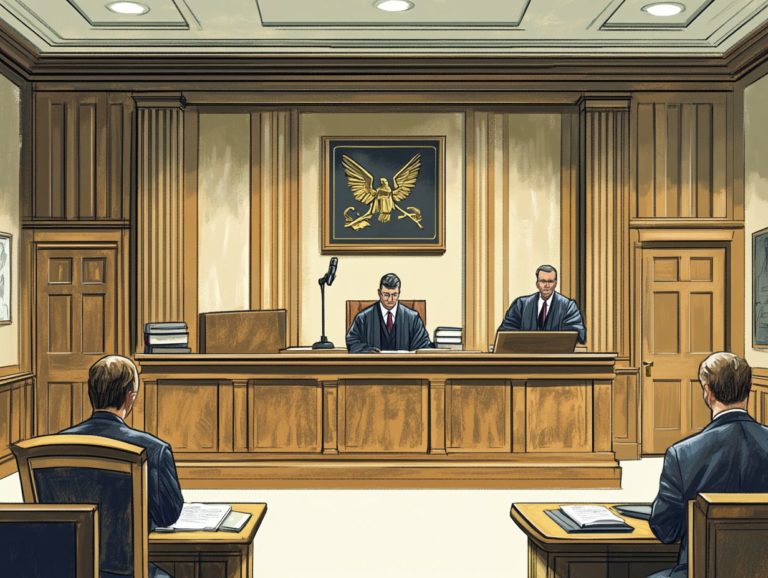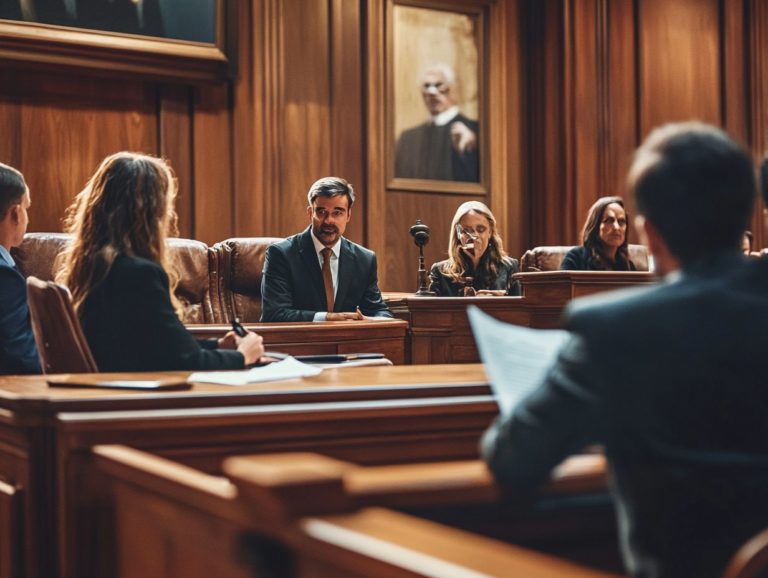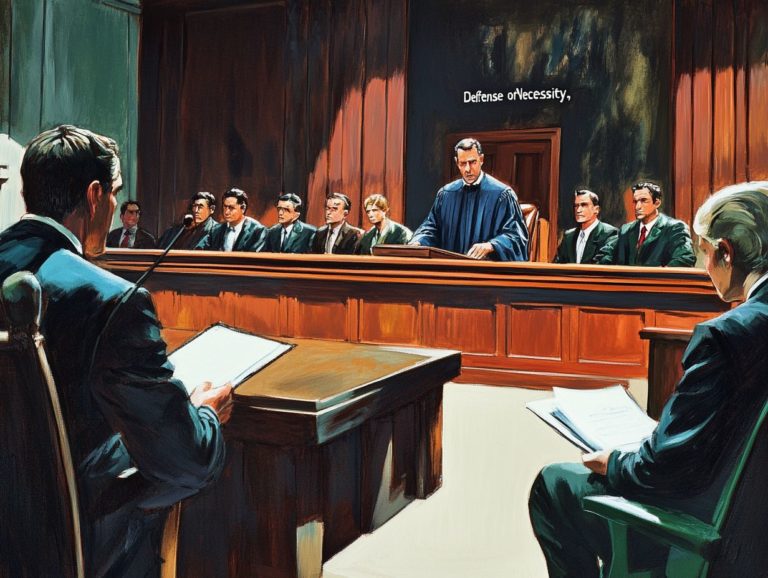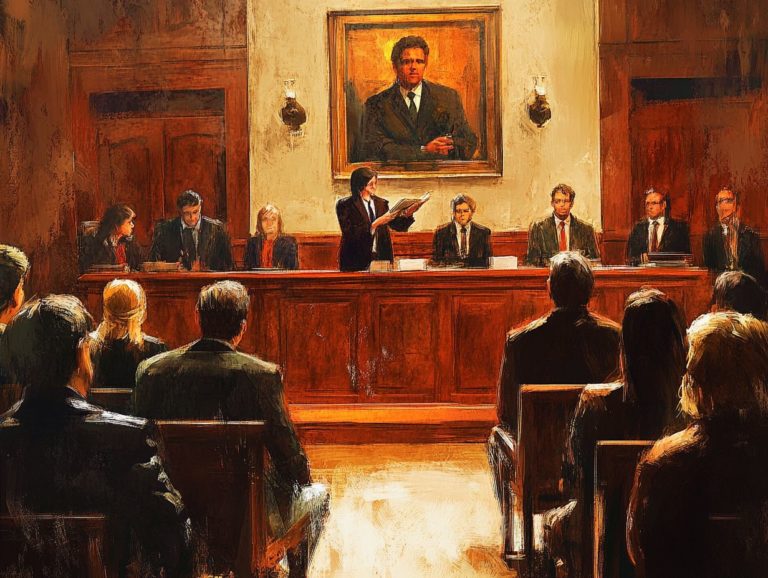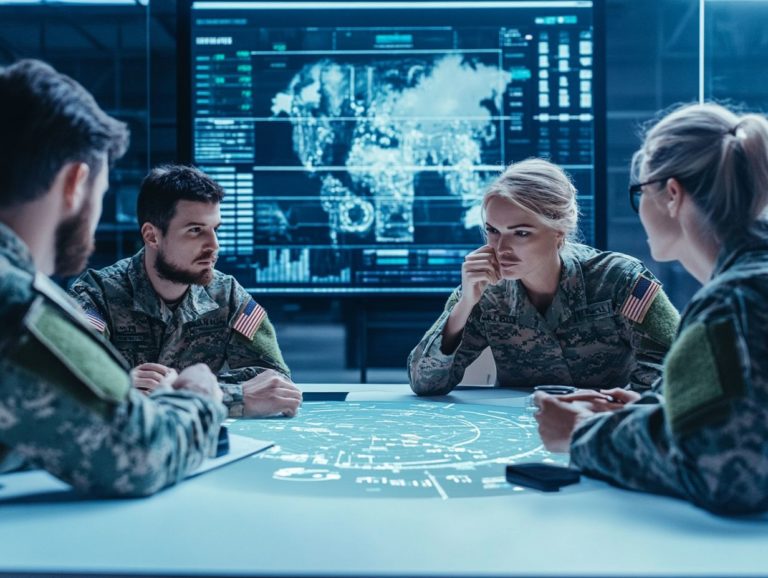The Role of Forensic Evidence in Defense
Forensic evidence is essential in the criminal justice system and serves as a cornerstone for both prosecution and defense strategies.
This article explores the essence of forensic evidence, highlighting various types from physical to testimonial and illustrating how it can be used to challenge prosecution claims.
We will debunk common misconceptions and emphasize the importance of expert witnesses, who play a crucial role in presenting evidence effectively.
Join us on this fascinating journey into the world of forensic evidence and its vital contribution to ensuring a fair trial.
Contents
- Key Takeaways:
- Understanding Forensic Evidence
- Types of Forensic Evidence
- How Forensic Evidence is Used in Defense
- Common Misconceptions about Forensic Evidence
- The Importance of Expert Witnesses
- Frequently Asked Questions
- Discover the role of forensic evidence in defense!
- Explore the types of forensic evidence used in a defense case!
- How is forensic evidence collected and processed?
- Can forensic evidence be used to prove innocence?
- What challenges can arise when using forensic evidence in defense?
- Is forensic evidence always reliable in a defense case?
Key Takeaways:
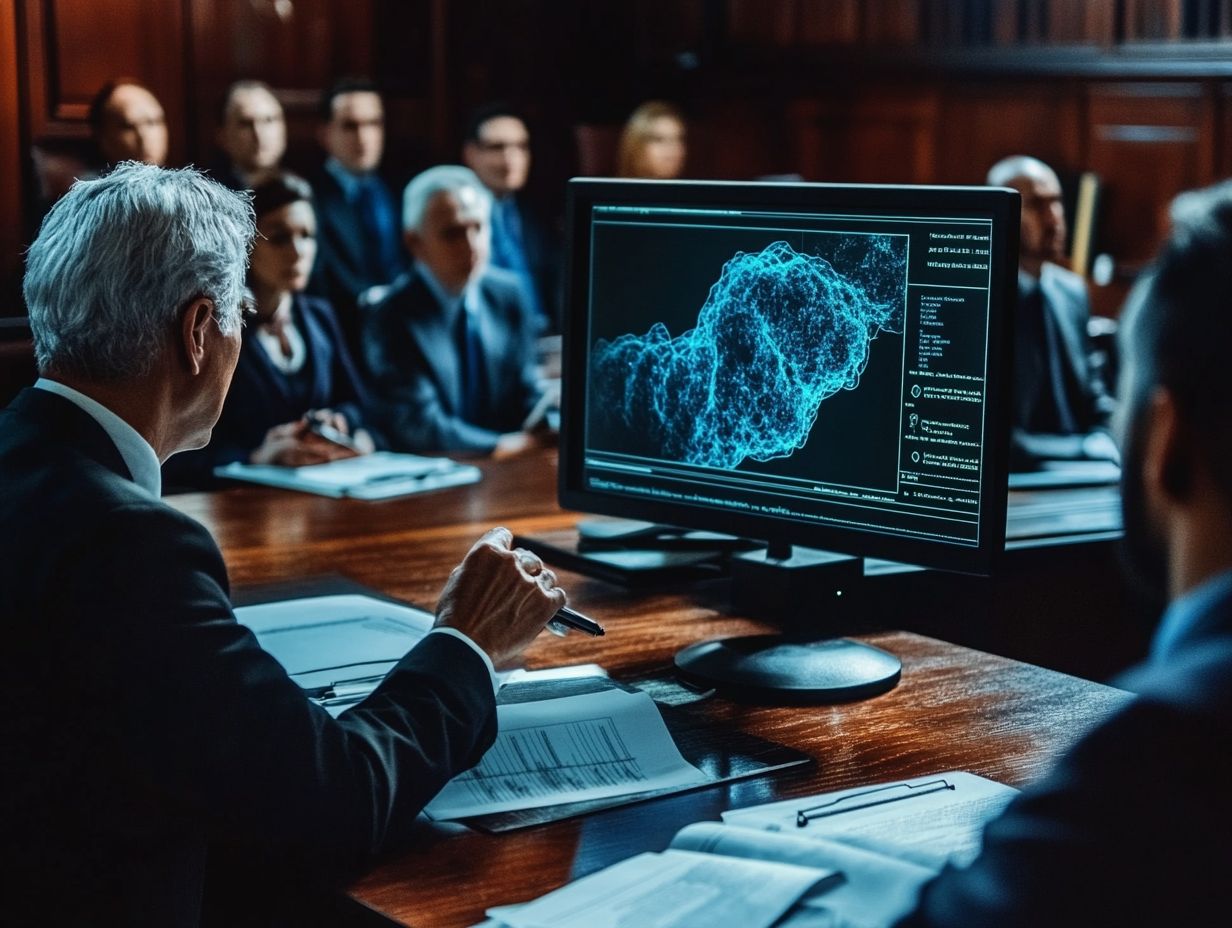
Forensic evidence refers to any physical or testimonial evidence that can be used in criminal defense. It is crucial for challenging the prosecution’s evidence and presenting counter-evidence in a trial. Expert witnesses are vital in explaining complex forensic evidence to the jury.
Understanding Forensic Evidence
Understanding forensic evidence is vital as you navigate the complexities of the criminal justice system. It plays a key role in crime scene investigations and legal proceedings.
Forensic evidence encompasses a range of scientific techniques used to collect, analyze, and interpret data from a crime scene. This ensures that the evidence you encounter is both reliable and relevant.
Whether it s DNA samples, fingerprints, or drug tests, the trustworthiness of evidence cannot be overstated. Forensic experts, equipped with specialized knowledge, assist legal professionals and defense attorneys in building compelling cases that can influence jury decisions.
What is Forensic Evidence?
Forensic evidence consists of information meticulously collected from a crime scene that can be scientifically analyzed and presented in court. This type of evidence is crucial in the legal system as it provides objective data that helps establish the facts of a case.
Professionals use various scientific analyses such as DNA testing, ballistics, and drug testing to gather insights that are important during investigations. Expert testimony often reinforces the validity of this evidence.
These specialists can clarify complex methods and findings to judges and juries. Their clear explanation of forensic results can significantly influence trial outcomes, highlighting the importance of reliability and accuracy in the judicial context.
Types of Forensic Evidence
The types of forensic evidence are crucial in criminal cases, categorizing the various forms of data you can collect and analyze to establish facts and enhance investigations.
Forensic evidence falls into two primary categories:
- Physical evidence: This includes tangible items like DNA, fingerprints, and trace evidence.
- Testimonial evidence: This encompasses witness accounts that can be scrutinized using forensic techniques.
Each type of evidence plays a distinct role in crime scene investigations and contributes to the judicial process.
Physical Evidence
Physical evidence consists of tangible items collected from a crime scene that can significantly aid in the investigation and prosecution of criminal cases. These items range from DNA evidence, which provides vital biological information, to fingerprints that uniquely identify individuals.
Drug tests are important for detecting the presence of substances, offering valuable insights into the circumstances surrounding a crime. All these forms of evidence are essential for building a strong case and presenting a compelling narrative in court.
Their reliability and objectivity often surpass testimonial evidence, making them vital tools in your pursuit of justice.
Testimonial Evidence
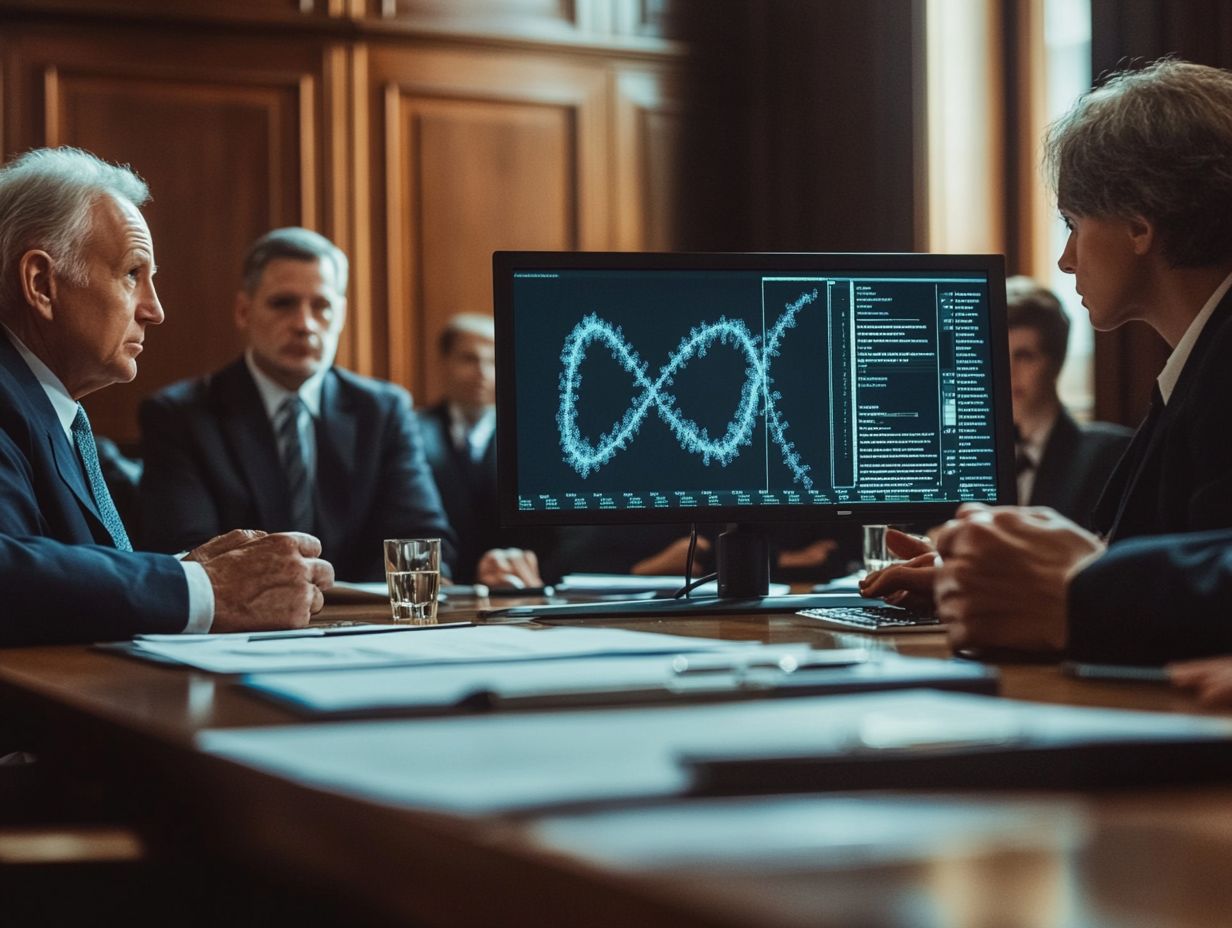
Testimonial evidence includes witness accounts and expert testimonies. These can strengthen or challenge the physical evidence presented in court.
This type of evidence plays a key role in shaping the story of the case. Insights from expert witnesses are particularly valuable.
Experts offer specialized knowledge, helping the jury understand complex subjects. Their credible assessments can significantly affect how jurors perceive the case.
Including expert testimonies can be crucial in swaying jury decisions. This can ultimately shape the outcome of trials.
How Forensic Evidence is Used in Defense
Forensic evidence is vital in developing criminal defense strategies. It equips you with tools to challenge the prosecution’s claims and build a strong case.
By evaluating the handling of evidence and its reliability, you can effectively counter the prosecution’s narrative. Forensic analysis provides an objective view of the evidence presented in court.
This significantly enhances the chances of a favorable outcome for the accused.
Challenging the Prosecution’s Evidence
Challenging the prosecution’s evidence is a key part of criminal defense. It relies on a thorough review of forensic evidence.
Defense attorneys use various strategies to question the validity of the forensic evidence presented. They analyze the chain of custody, which refers to how evidence is collected, stored, and processed.
Even a small mistake can suggest potential contamination or misrepresentation. Defense lawyers may also bring in expert witnesses to discuss accepted scientific standards.
This comprehensive approach aims to cast doubt on the credibility of the evidence. It also raises serious questions about the integrity of the prosecution’s entire case.
Presenting Counter Evidence
Presenting counter evidence is a crucial tactic in your defense strategy. It allows you to introduce forensic evidence that undermines the prosecution’s claims.
This approach requires a thorough analysis of both physical and digital evidence. Expert witnesses in areas like ballistics and DNA analysis provide invaluable insights.
They help interpret complex data and offer alternative explanations for the evidence against you. Successfully incorporating such counter evidence strengthens your defense.
Common Misconceptions about Forensic Evidence
Misunderstandings about forensic evidence can greatly affect public perception and jury decisions. Many believe that forensic science is foolproof.
However, evidence interpretation can be subjective and influenced by various factors. Addressing these misconceptions helps foster a better understanding of forensic evidence and its role in the justice system.
Myths and Facts
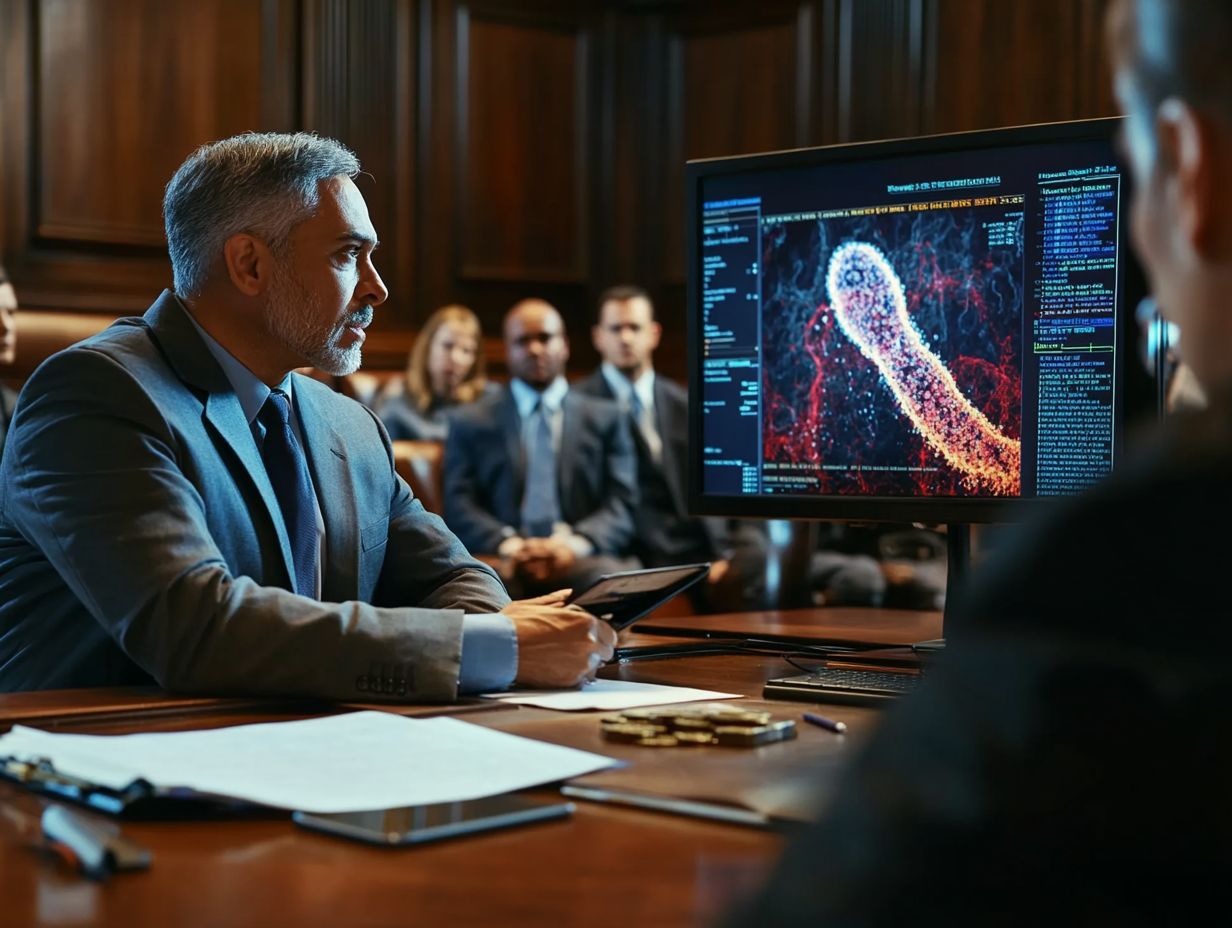
Myths and facts surrounding forensic evidence often create a fog of confusion in the courtroom and among legal professionals, leading to misunderstandings that can change the outcome of cases.
You need to understand these misconceptions, as they can shape jurors’ perspectives and influence critical decisions made by judges.
Differentiate between scientifically sound principles and the dramatic portrayals often seen in the media. By examining common beliefs about forensic science, you can uncover factual truths that reveal the reliability or limitations of various types of evidence.
For instance, a prevalent myth suggests that DNA analysis, the process of examining genetic material to find matches or identify individuals, is infallible and immune to error. In reality, while DNA analysis boasts impressive accuracy, it isn t impervious to contamination or human mistakes.
Another common misconception is the belief that forensic scientists can consistently achieve a definitive match; however, the intricacies of sample size and quality can significantly affect the results.
Many people assume that the presence of fingerprints guarantees a solid connection to the crime, overlooking the fact that fingerprints can be common among numerous individuals, complicating their evidential value.
It’s crucial to understand these issues to navigate the legal landscape better!
The Importance of Expert Witnesses
Expert witnesses hold a pivotal position in the legal process, offering specialized knowledge and insights that can profoundly impact courtroom presentations and the decisions of jurors.
As a forensic expert, your deep understanding of various forensic techniques enables you to interpret evidence with clarity, helping legal professionals craft compelling cases.
Your testimony not only enhances the credibility of the evidence but also serves to demystify intricate scientific concepts for jurors, ultimately advancing the pursuit of justice.
Role of Expert Witnesses in Presenting Forensic Evidence
The role of expert witnesses in presenting forensic evidence is crucial, as they lay the groundwork for understanding complex scientific analyses.
By breaking down intricate methodologies into easily digestible concepts, they empower you, the juror, to grasp the significance of the evidence being presented.
These professionals clarify technical details with remarkable clarity and place the findings within the broader context of the case.
Their skill in translating specialized jargon into relatable language bridges the gap between advanced scientific principles and everyday reasoning, enabling you to appreciate the weight of the evidence.
Ultimately, this enhances the strength of the legal argument. A more informed jury is far better equipped to engage in sound deliberations.
Frequently Asked Questions
Discover the role of forensic evidence in defense!
The role of forensic evidence in defense is to provide scientific and objective evidence to support a defendant’s innocence or to cast doubt on the prosecution’s case, which is crucial in understanding the role of the jury in defense.
Explore the types of forensic evidence used in a defense case!
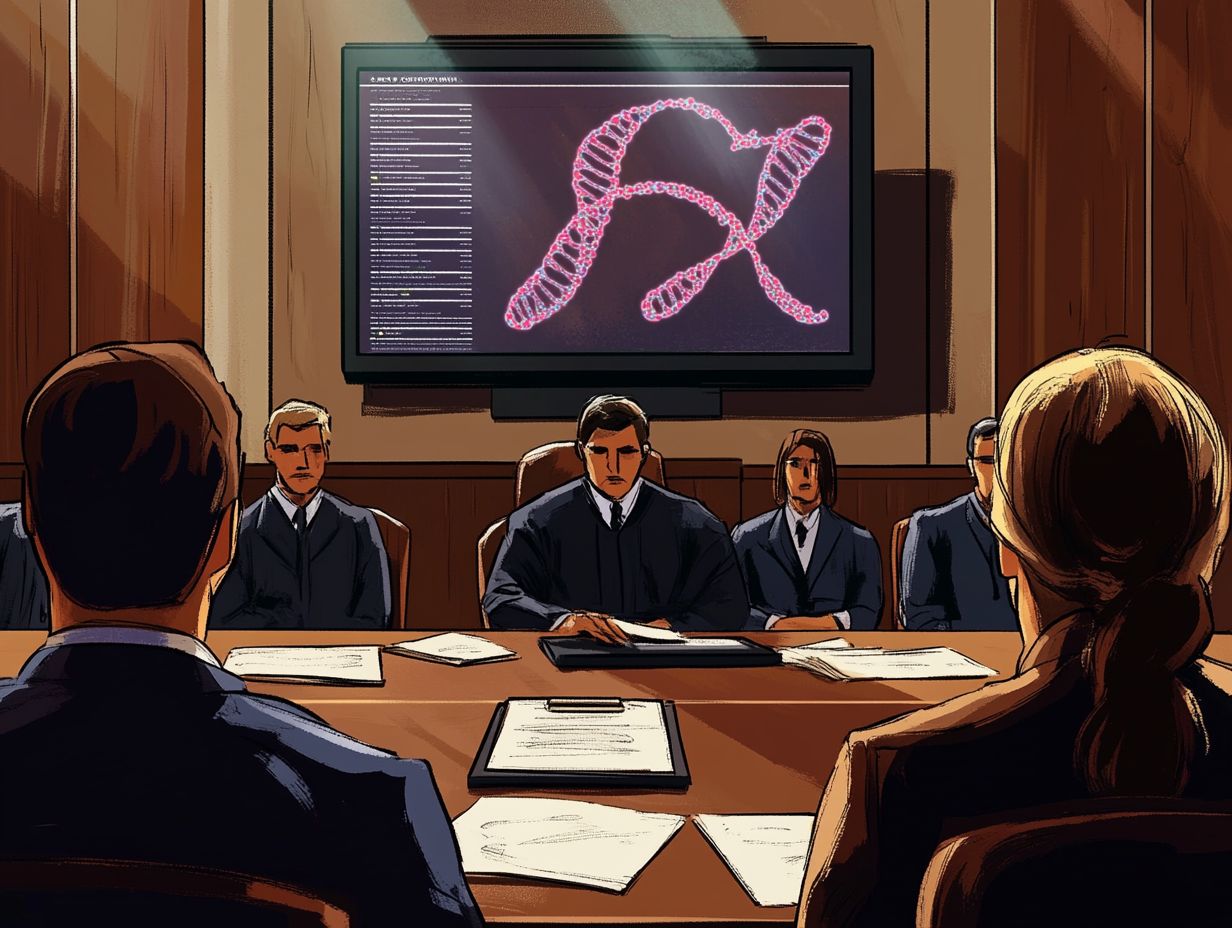
Forensic evidence can include DNA analysis, blood spatter patterns, ballistics, fingerprints, toxicology, computer and digital evidence, and forensic accounting.
How is forensic evidence collected and processed?
Forensic evidence is collected and processed by trained professionals using specialized tools and techniques, including sample collection, preservation, analysis, and interpretation of the results.
Can forensic evidence be used to prove innocence?
Yes, forensic evidence can be used to prove innocence in a defense case. For example, DNA evidence can show that the defendant was not present at the crime scene, or ballistics evidence can prove that a different weapon was used.
What challenges can arise when using forensic evidence in defense?
Challenges can arise when using forensic evidence in defense, such as potential contamination of evidence, improper collection or processing, and the need for expert witness testimony to explain complex scientific findings.
Ready to dive deeper into forensic science? Join us in exploring these critical issues!
Is forensic evidence always reliable in a defense case?
Forensic evidence is not always reliable in a defense case. Factors like human error, bias, and the limitations of forensic science can impact the accuracy of the evidence.
The defense team must carefully look at and question the evidence presented by the prosecution. They should challenge any weaknesses to ensure a fair trial.
Understanding the reliability of forensic evidence is crucial. Every detail counts in a defense case!

